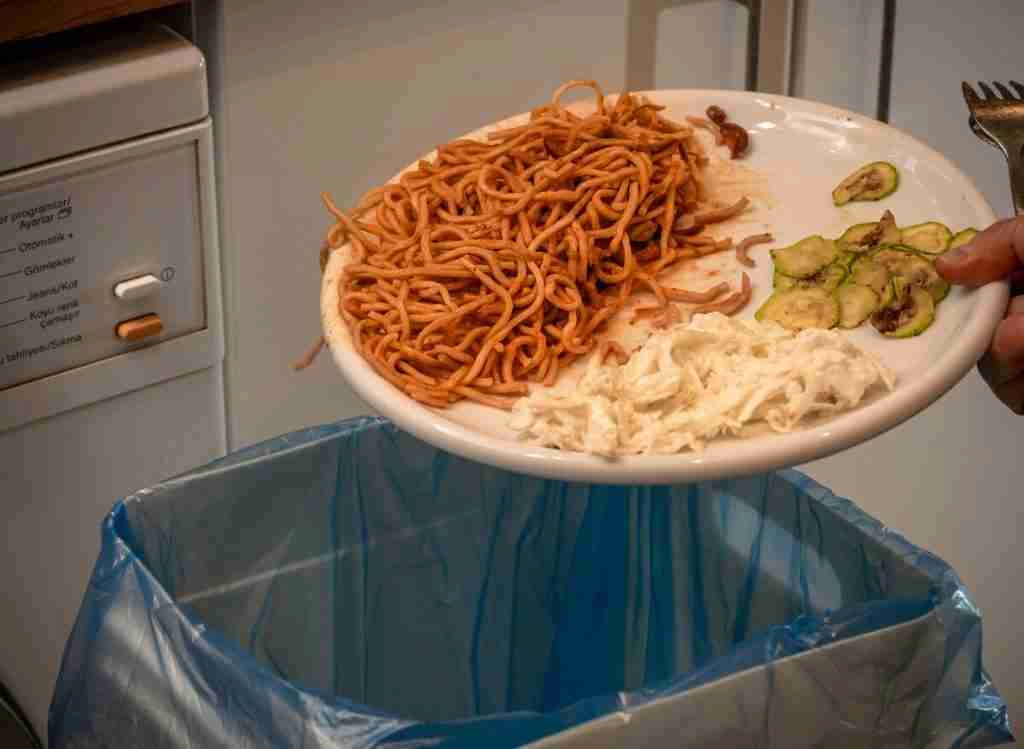
Pasta is one of those delicious and relatively healthy foods, and you can enjoy baked or boiled pasta at any time as it is easy and instant to cook. However, sometimes you may have pasta leftovers and wonder what to do with it. Composting is another way to deal with pasta leftovers. But can you compost pasta?
Cooked pasta can be composted, according to the North Carolina State University Extension. Both uncooked and cooked pasta is perfectly safe to compost. And generally, you can compost anything you can eat because any organic matter will eventually decompose and become good fertilizer.
Composting is an effective way to turn your unwanted leftovers into organic rich-nutrient fertilizer. But, even though pasta can be a great addition to compost, there are a few things you should consider.
See also: Is Bt Really Safe For Organic Gardening? Let’s Find Out The Truth!
Can You Compost Pasta?
You can compost uncooked and cooked pasta. However, uncooked pasta is better for composting than cooked pasta because cooked pasta attracts wild animals looking for a hearty meal.
In addition, uncooked raw and dry pasta is less likely to attract rodents, insects, and other pests that invade your compost bin. But you can deter pests and other wild animals by burying cooked pasta deep in your compost or closing your compost bin.
Smaller pieces of pasta scraps decompose immediately, while larger pieces don’t. So, ensure you cut the larger pieces into small ones so that these may help compost immediately.
After adequately cutting short the pasta scraps, spread them evenly and cover them with leaves or wood shavings. These will help make the pasta scraps moist quickly and therefore decompose and turn into a rich nutrient fertilizer.
See also: How To Successfully Kill Blackberry Bushes Quickly: A Quick Guide.
What Are Some Common Issues With Composting Pasta?
Composting pasta is a good step toward saving our environment because it helps enrich the earth and reduce food wastage. However, you must learn how to compost pasta properly to prevent some common issues people face while composting pasta.
The biggest concern when composting pasta is that it can attract unwanted pests, including flies and rodents. Additionally, cooked pasta will generally be covered in other food items, such as pasta sauce, vegetables, meat, and cheese.
Here are some common problems that you may face when composting pasta.
1- Composting Pasta May Attract Pests and Birds
You can compost both cooked and uncooked pasta. However, to avoid attracting unwanted pests, bury any pasta deep in the middle of your compost pile and cover it with carbon-rich materials.
The main problem that you may face while composting pasta is pest attack. Generally, pasta scraps attract certain pests and birds like raccoons, mice, or rats. This issue is common mostly when composting cooked pasta.
See also: Will Grass Seeds Successfully Germinate On Top Of Soil? Let’s Find Out The Answer!
How To Prevent Unwanted Pests From Invading Your Composting Bin:
Here are some ways that will prove beneficial for you when composting pasta.
- Spread pasta in a moderate quantity.
- Never spread too much food.
- Bury the pasta scraps you are going to compost with some other nonedible scraps.
2- Pasta Does Not Decompose Easily
One of the issues with composting pasta is that it does not decompose easily. To ensure that the pasta decomposes faster, try to cut it into small pieces because small pasta pieces decompose easily, and the composting process happens quickly.
More importantly, avoid decomposing pasta into large pieces to make it decompose faster.
3- Larger Quantity Of Pasta Does Compost Easily
Another mistake that most people make is trying to compost a larger quantity of pasta at once.
In addition, a large amount of pasta will invite more animals, pests, and birds towards the scraps. So, try to maintain the quantity of pasta you are trying to compost reduced.
See also: Can Tomatoes Actually Grow In Indirect Sunlight: Here’s The Truth!
4-Choosing Improper Composting Bin
It is not necessary to use a bin to compost pasta. Some people use a container to help retain heat and moisture and keep the pile neat.
You might also live in an area where using a bin would be more appropriate than an open pile. In addition, choosing a suitable composting bin with the feature will increase your chance of composting pasta.
Also, a proper composting bin will prevent unwanted pest attacks or damages caused by pest, animal, or bird attacks. So, never overlook this preventive measure while composting your food scraps.
5- Choosing An Improper Way To Compost pasta
Generally, compostable organic materials are divided into two groups: browns and greens.
- Browns include sugar-rich carbon sources providing energy to microorganisms, absorbing excess moisture, and giving structure to your pile. Examples of browns include newspapers, dead fallen leaves, napkins, cardboard, straw, sawdust, hay, twigs, dryer lint, and bark.
- Greens include protein-rich nitrogen sources providing moisture to microorganisms. Generally, greens are vegetables and fruit, grass clippings, tea leaves, coffee grounds, livestock manures, and alfalfa.
Commonly, successfully composting pasta will depend on what methods you use.
- Burying the pasta deep enough will help you avoid attracting insects.
- Using hot composting method in a locked container will be fine.
- Adding pasta to a cold pile of yard waste will attract pests or other wild animals.
See also: How To Successfully Get Burnt Grass Green Again: Here’s a Quick Guide
Tips On Effectively Composting Pasta:
- Properly prepare your compost bin: Before adding pasta scraps to your compost, ensure it has aeration for efficient air movement in and out of the compost bin.
- Find a suitable location for your compost bin. Place your compost bin in a well-ventilated spot and the sun’s direction.
- Set up your compost bin or pile in a suitable location at least six feet away from your home or any wooden structures.
- The location for your compost bin or pile should be a flat, open space and far from a water source.
- Ensure you keep the areas in front of and above the pile or bin clear. The location for your compost bin should be accessible for you and away from wildlife all unwanted pests such as flies and rodents.
- To help it retain moisture, place your compost bin or pile in a shaded area within reach of a garden hose. Because too little or too much moisture will slow down the decomposition process. You need approximately 40% to 60% moisture in a pile.
- If you are composting uncooked pasta, break it scraps into smaller pieces and mix them with other brown compostable materials such as sawdust, shredded cardboard, dried leaves, and shredded tree branches.
- If you are composting cooked pasta, ensure you remove all meat and fish scraps.
- Ensure you do not add too much pasta waste, mainly if you are adding cooked pasta. When you reach about 2/3 of the compost bin, stop adding brown compostable materials containing pasta scraps.
- To prevent the cooked pasta from smelling and attracting unwanted pests, bury its scraps in the center and other browns.
- After two to three weeks, start turning the compost to increase air circulation.
How Long Will It Take For Pasta to Decompose?
In general, it takes about three months for pasta scraps to decompose because it is an easy and fast-degradation compostable element.
However, if you mix with other home items, such as avocado pit, unchopped cardboard, pineapple peels, crowns that aren’t easy to decompose quickly, it may sometimes take six months or a year.
See also: Is PVC Really Safe For Organic Gardening? Here’s The Truth!
Can Dry Pasta Go in Compost?
Compositing dry or uncooked pasta is safe and easy as compared to cooked pasta. Here are some benefits of carrying out composting with dry pasta.
- Dry pasta doesn’t generally attract animals, pests, or birds.
- When dry pasta gets moistened, it breaks down quickly into beneficial nutrients as compared to cooked pasta.
- Dry pasta is safe to use for composting, and it needs comparatively less watching or preventive measures.
See also: Here’s Everything You Must Know About Shipping Container Farms
What Should You Not Put in Compost?
Here is a list of items you should avoid composting.
| Items Should You Not Put In a Composting Bin | Why You Should Not Compost These Items |
| – Dirty diapers – Cat or Dog feces – Litter | They may contain pathogens and other parasites |
| – Fish – Bones – Meat – Fats – Grease – Oils – Lard – Eggs – And dairy products, including butter, yogurt, milk, and sour cream | These items may create odors, attract unwanted visitors, such as rodents and flies. |
| – Wood ash | It is okay to add a few or two, but adding too much may harm microbes, slow the composting process, cause smelly ammonia gas releases, and eventually reduce nitrogen. |
| Heavily coated paper, including: – Magazines – Wrapping paper – Greeting cards with metallic inks – Catalogs – And photographs | Heavily coated paper resists decay |
| Coal and charcoal ash | Both generally contain substances harmful to plants and also resist composting. |
| Used toilet tissue or facial | Used toilet tissue or facial may carry bacteria and parasites. |
| Insect-infested or Diseased plants | Because the insects and diseases can survive and contaminate other plants. |
| Yard trimmings that are treated with chemical pesticides. | Residual chemicals may affect plants where you place your composting bin or kill beneficial composting organisms. |
| Twigs or black walnut tree leaves | Often release substances that might damage your plants. |
Final Thoughts
Overall, you can compost pasta, but just ensure you do it properly. Composting pasta is not an impossible task if you do right.
Above all, whenever you are considering composting, remember this list of items that you should not never compost.


